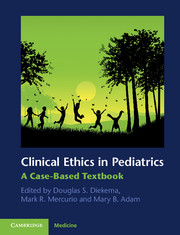Book contents
- Frontmatter
- Contents
- Contributors
- Preface
- Section 1 Core issues in clinical pediatric ethics
- Pediatric decision-making: informed consent, parental permission, and child assent
- 2 Pediatric decision-making: adolescent patients
- 3 Parental refusals of recommended medical interventions
- 4 Adolescent confidentiality
- 5 Refusals of treatment in adolescents and young adults
- 6 Family beliefs and the medical care of children
- 7 Fidelity and truthfulness in the pediatric setting: withholding information from children and adolescents
- 8 Fidelity and truthfulness: disclosure of errors
- 9 Requests for “non-therapeutic” interventions in children: male circumcision
- Section 2 Ethical issues at the beginning of life: perinatology and neonatology
- Section 3 When a child dies: ethical issues at the end of life
- Section 4 Ethical issues posed by advances in medical technology and science
- Section 5 Children, public health, and justice
- Section 6 Special topics in pediatric ethics
- Index
- References
9 - Requests for “non-therapeutic” interventions in children: male circumcision
from Section 1 - Core issues in clinical pediatric ethics
Published online by Cambridge University Press: 07 October 2011
- Frontmatter
- Contents
- Contributors
- Preface
- Section 1 Core issues in clinical pediatric ethics
- Pediatric decision-making: informed consent, parental permission, and child assent
- 2 Pediatric decision-making: adolescent patients
- 3 Parental refusals of recommended medical interventions
- 4 Adolescent confidentiality
- 5 Refusals of treatment in adolescents and young adults
- 6 Family beliefs and the medical care of children
- 7 Fidelity and truthfulness in the pediatric setting: withholding information from children and adolescents
- 8 Fidelity and truthfulness: disclosure of errors
- 9 Requests for “non-therapeutic” interventions in children: male circumcision
- Section 2 Ethical issues at the beginning of life: perinatology and neonatology
- Section 3 When a child dies: ethical issues at the end of life
- Section 4 Ethical issues posed by advances in medical technology and science
- Section 5 Children, public health, and justice
- Section 6 Special topics in pediatric ethics
- Index
- References
Summary
Introduction
“Non-therapeutic” interventions are those performed or requested for reasons other than medically indicated need. Examples in the ethics literature include leg-lengthening surgery for children with achondroplastic dwarfism, or appearance-normalizing surgery for children with craniofacial abnormalities that have no functional significance (Parens, 2006). This chapter focuses on childhood male circumcision that is not medically indicated. While there are relevant differences among these cases, they demonstrate that requests for non-therapeutic interventions in children combine several complex issues for pediatric ethics: the rights and vulnerabilities of children; the boundaries of parental prerogatives; and the difficulty of defining a procedure’s benefits based on social, cultural, or religious considerations. Physicians asked to perform non-therapeutic interventions on children must assess whether acceding to these requests is medically appropriate and ethically permissible.
Case narrative
During an annual check-up, the parents of a 7-year-old boy asked the pediatrician to recommend someone to circumcise their son. Having just examined the child, the pediatrician could identify no clinical indication for circumcision, and questioned the parents about why they wanted the procedure performed. They explained that their son was born in the UK, where newborns are not routinely circumcised because the National Health Service only funds circumcisions done for medical indications. Upon moving to the United States, the parents decided that they wanted their son circumcised in adherence with their culture and with what they presumed was local custom. They believed that circumcision was the standard medical practice in the United States and that their son would feel less conspicuous among his peers.
- Type
- Chapter
- Information
- Clinical Ethics in PediatricsA Case-Based Textbook, pp. 43 - 50Publisher: Cambridge University PressPrint publication year: 2011

